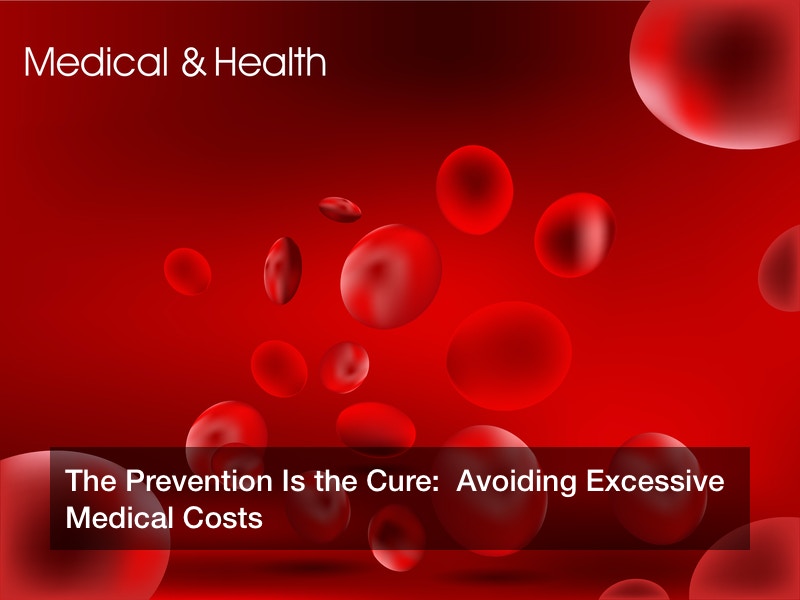
When it comes to health, everyone has a base level of needs that they demand for themselves and others without realizing it. You might never expect to go into surgery or be on experimental antibiotics, but recognize the value of getting an annual check-up and following some common health guidelines. Especially with increasing medical costs, it can be prudent to read up on the latest health trends that will benefit you for little to no out of pocket expense.
Some of these trends can be incredibly simple, like avoiding weight gain and inflammation by avoiding heavily processed foods. Others are more complicated, like seeking out a financial planner in order to create a savings account and various investments that may produce income you can use for unexpected expenses. Whatever the skill set, know that in the face of increasing medical costs you are able to handle it. With a little bit of determination and some clever wit, you will pull through with flying colors.
In this article we’ll review some ways to thrive under, save for, and avoid increasing medical costs when possible. While we can’t guarantee a magic bullet that will take away all your troubles and concerns or avoid having to sue for medical malpractice, these simple tips and tricks may be worthwhile to know. After all, as the old saying goes: “an ounce of prevention is worth a pound of cure.”
Get Your Regular Check-Up: Find Problems Before They Snowball
Just like how a visit to a dental clinic for a cleaning can help assure you that you’re cavity-free, your annual check-up with a physician is a similar concept. By being regular in scheduling your medical appointments to check on various health markers, you can catch diseases and their preceding ailments before they arrive in full force and put you in the hospital. You can also take this time to chat with your doctor about new health trends, including what’s worth paying attention to and what’s a fad. Even if your doctor is not completely educated on these issues, they can give you better information than the man on the street.

Your doctor may also be able to recommend preventative treatments that are generic or inexpensive to deal with health conditions you’re experiencing. Instead of writing a prescription for steroids or other anti-inflammatory drugs, they may be able to ask you about your diet, habits, and whether you take dietary supplements. By agreeing to quit smoking, eat more whole foods, and stop smoking, you can nip a problem away without having to pay for a medication that simply masks the symptoms. If your doctor can’t provide you with this information, they might be able to recommend you to a specialist or friend who is qualified to discuss these things.
An Ounce of Prevention Is Worth a Pound of Cure
Perhaps the easiest way to avoid increasing medical costs is to simply avoid them entirely. While this may seem like magical thinking, there is some logic to it that should be intuitive to most people. If you can avoid eating heavily processed foods (such as fast food, various sugars, and alcohol) then you can potentially set yourself up for a good chance to avoid many of the diseases that they eventually cause down the road. While they may seem fun in the moment and without consequences, eventually they will end up becoming a problem if indulged in with regularity. Sugar, alcohol, and excessive salt consumption are known to cause inflammation which leads to a variety of disorders.
Similarly, avoiding illegal drug use and having safe(r) sex will also enable you to relax and have peace of mind when it comes to monitoring your health. It is up to the individual to decide whether to indulge in them, but they are certainly not without consequences as documented in the medical literature. If you decide to indulge in these behaviors, research all you can about how to do them while minimizing the harm you do to yourself. Maximizing your healthy behaviors and minimizing your unhealthy ones will always put you on a better road to success with your health and happiness.
Taking up an exercise regime is a great way to deal with preventing increasing medical costs, especially for obesity and blood pressure disorders. Exercising on a regular schedule is shown to reduce stress, slow weight gain, and help manage a variety of chronic conditions. You should discuss with your doctor what type of exercise regime is realistic and best for you so that you don’t over exert yourself and end up with other, perhaps even more serious problems. There are many forms of exercise you can do without any special equipment at all, and many other forms (such as bicycling or weights) that require minimal equipment for maximum benefit.
Diet, Supplements, and More
You may be wondering if you can stop increasing medical costs through prevention with dietary supplements. The answer isn’t so clear, because dietary supplements are not regulated like medication is. Therefore, it is hard to know what quality standards the companies that manufacture them are adhering to, and independent testing can be hard to verify. That being said, you should always talk to you primary care physician about whether any dietary supplements can work for you or will interact with your body and other medications in a bad way.

Diet has a large impact on our health, and while there are many dietary “fads” out there, science is aware of a lot of food that do have healing properties to them. The antioxidants in fruits/vegetables have been well studied, as well as the “healthy fats” found in olive oil, fish, and nuts. Taking a serious look at your diet and trying to make changes for the better can mean the difference between being unhealthy and feeling great, so it’s worth looking into. Combing quality food with certain other foods (such as turmeric or garlic) can be a great way to add “dietary supplements” to your health regime in the form of whole foods.
When a Rainy Day Comes (and You Slip and Fall)
You don’t have to be a certified financial planner in order to have heard the term “saving for a rainy day,” but it might be worth talking to one about the concept. When you save for any occasion (whether it rains or not), you insulate yourself from taking the maximum financial hit on any particular issue. Falling down and breaking your arm is bad enough, but you can probably afford those costs out of pocket. Breaking your arm so bad that you eventually need specialized surgery that requires medical grade skin care is another issue entirely.
A financial planner can help you not just understand financial terms and the different types of accounts that are available to you, but maximize their positive impact on your life as well. If your concern is increasing medical costs and you want to provide some extra income into the future, they can help you set up a Healthcare Savings Account that specifically invests towards expenses for medical costs and many times allows these earnings to grow tax free. They may also be able to help you find a high-yield savings account to park your savings to earn a higher amount, as well as structuring your taxes and other finances to help lower your financial burden.
Increasing medical costs often happen as we age and become more sickly, which is usually when many people are retired or living off of savings. Therefore you will want to consult your financial planner about having a quality retirement account, something that many Americans do not have. In fact, it’s estimated that only 13% of people aged 60 and above have any sort of retirement account that they could draw on in order to pay for unnecessary expenses. You’ll want to ask about whether a Traditional IRA or Roth IRA is best for you, or if you should stay with your company’s 401(k) or 403(b) to best increase your retirement savings.
Try and Avoid Debt At All Costs (Using Credit and Payments Responsibly)
When a medical-related expense comes up, the best course of action is to pay it in full. Not only can medical expenses be difficult to discharge legally, but depending on how you pay for it you can be in for some hefty interest or refinancing costs down the line. Many hospitals and healthcare providers will allow you to structure payments into a plan to be paid off in time, and you should try to avoid putting the expenses off for later if at all possible. Many people shunt these expenses off onto credit cards, and the average American has an estimated $2,200 U.S. dollars in credit card debt.

Using a credit card to pay a medical bill can be somewhat of a double-edged sword that demands a careful pros and cons list in order to navigate correctly. While a proper cashback rewards card can be used to pay increasing medical costs at many insurance agencies and other providers while providing a cash incentive, it almost always comes with hidden costs. You will always have to pay a minimum payment, which you may think is quite affordable, but the interest costs attached could mean that you pay double or even triple the cost over time. It is always worth consulting your credit card company to find out whether they can offer special payment plans or interest rates for medical expenses.
In times of crisis and desperate financial need, increasing medical costs can sometimes be discharged entirely or for a lower amount than originally billed. This is relatively unusual and a sometimes complicated legal process that requires the expertise of lawyers and other experts that are not within the expertise of this article. You should consult within the professionals in the community you live in and reach out for help from where the bill originated, among other sources. You may be able to receive pro bono assistance with this from the government, local companies, or an individual attorney.
If You Can’t Pay, Don’t Be Afraid to Accept Help
If you’ve tried everything under the sun to cope with your increasing medical costs, but are still stuck against a wall, you may want to try other sources of help that you haven’t tried before. If you’re above a certain age, you may be able to enroll in medicare and have the costs diverted away by special programs for the elderly and disabled people. Even if you’re past the date that you should be enrolled, there may be special options and qualifying events available to you that are worth checking out.
Perhaps you’re a member of a fraternal or religious organization, in which case you may also be able to receive financial and other forms of assistance from your peers in a variety of ways. Whether it’s a church collection for your minor fracture treatment or your friends bringing you meals when you feel down, there are lots of ways that individuals can help each other without having to go through bureaucratic structures. This can be a truly “community driven” way to pay for your increasing medical costs no matter what the procedure.

Alas, if you are truly alone and without family, friends, and do no qualify for government help there are still ways to cope with increasing medical costs. Because technology is able to connect a variety of people that are interested in helping out with numerous different causes. From helping to build gardens to offloading some of the cost of your essential bone grafting treatment, sites like GoFundMe and other crowd sharing platforms allow you to take small donations from the general public to use toward a cause they deem worthwhile. If you meet that definition by people that are looking, you could be making some new friends will paying for your procedures.
Stress Less and Learn Acceptance
At the end of the day, there may not be much you can do about increasing medical costs, especially if you’re in a life or death situation that demands attention. To not pay the bill would be to deny yourself vital treatment and not live an optimal life, but to accept a large bill (one that you won’t know the amount of until the treatment is done) is almost as risky. Especially if the resulting medical procedure is part of an ongoing treatment of a chronic condition (such as arthritis treatment or pain management), it is better to be healthy and safe than worry about finances.
Money will come and money will go, but making smart decisions to live your best life today so that you can plan for a better tomorrow is part of self-improvement. Along with making great decisions for yourself when it comes to increasing medical costs, you can learn preventative techniques to hopefully decrease your risk of developing common health conditions in the future. From developing relaxing routines and techniques (such as meditation and sleep hygiene) to eating a healthy diet and exercising, little changes can end up making the difference in the long run regardless of your financial situation.



